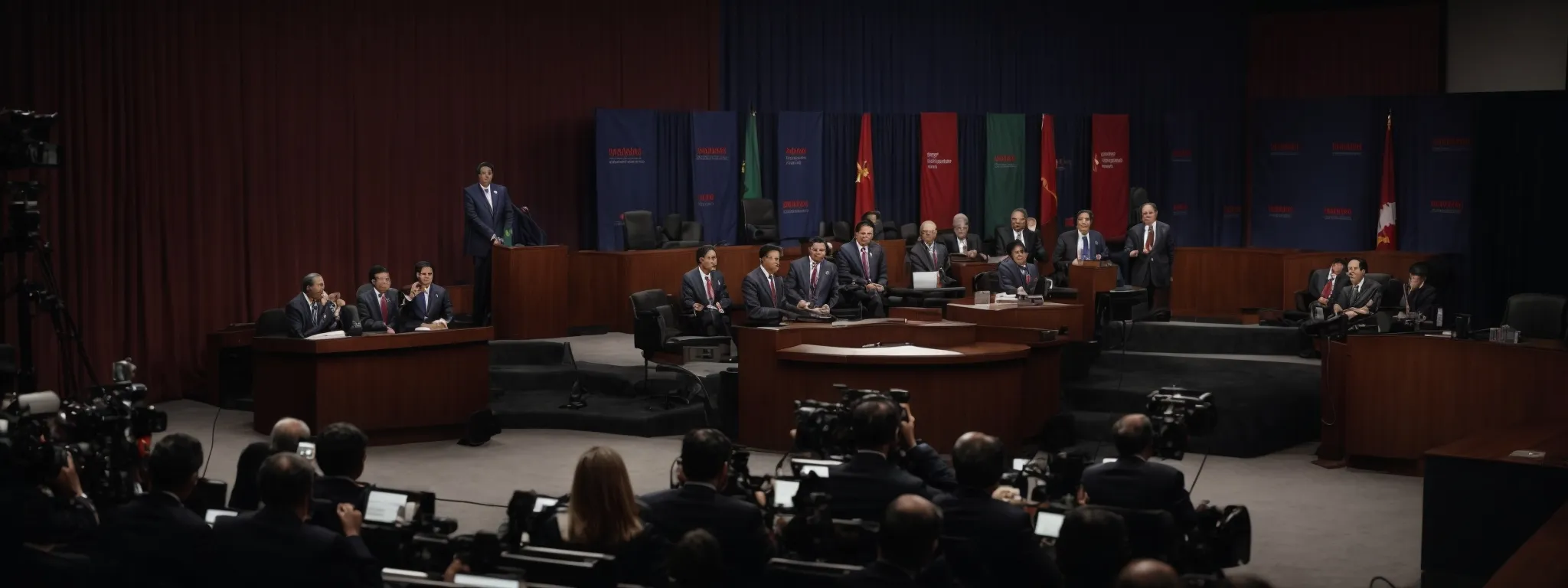Exploring Political Biases: SEO Reality Check on Google’s Algorithms
Unveiling the Influence of Political Bias in Google’s Search Algorithms Amidst a politically polarized landscape, the neutrality of Google’s search algorithms remains a hotly debated topic. Accusations […]
Unveiling the Influence of Political Bias in Google’s Search Algorithms
Amidst a politically polarized landscape, the neutrality of Google’s search algorithms remains a hotly debated topic.
Accusations ranging from suppression of conservative viewpoints to an overrepresentation of liberal content have cast a critical eye on the tech giant’s influence over the flow of information.
This rigorous scrutiny underscores the importance of transparency and fairness within the realm of search engine optimization and the pivotal role SEO services by LinkGraph play in ensuring a level playing field for all ideologies.
As experts dissect Google’s complex search formula, they aim to illuminate the intricate balance of political content users encounter.
Keep reading to uncover the layers of Google’s search algorithm and how SEO strategies may contribute to or combat perceived political bias.
Key Takeaways
- Google Faces Scrutiny Over the Neutrality of Its Search Algorithms and Potential Political Content Bias
- Rigorous Analyses and Methodologies Are Essential to Determine the Presence of Partisan Filtering in Search Results
- Personalization Features of Google’s Search Algorithms May Influence the Perception of Political Bias by Users
- The Visibility and Distribution of Political Content Are Critical for an Informed Electorate and Balanced Public Discourse
- SEO Strategies Can Impact the Visibility of Political Content, Raising Questions About Optimization Tactics and Biases
Dissecting Google’s Algorithm for Political Neutrality

As the digital age progresses, questions of objectivity and fairness within technology platforms have become increasingly paramount.
The core of the issue often lies with entities like Google, whose search algorithms are scrutinized for transparency and bias.
Understanding the basis of search algorithm neutrality is essential for maintaining the integrity of information dissemination.
Investigations into Google’s protocols reveal a Complex System where political neutrality is aspired but the potential for inadvertent preference looms, prompting a closer examination by industry professionals, policy makers, and academics seeking to ensure that the tech giant’s influence on public opinion and knowledge remains impartial and equitable.
Understanding the Basis of Search Algorithm Neutrality
Google’s search algorithms, the heart of the tech company’s service, are designed to furnish users with the most relevant and valuable information in response to their queries. Key to this service is the principle of algorithmic neutrality, a concept that purports a Non-Partisan Approach to information ranking and visibility.
The aspiration for an unbiased digital arbitrator necessitates a search algorithm that transcends political leaning. Thus, Google continuously updates its search protocols in an effort to eliminate bias, ensuring that the search engine serves as a neutral platform that reflects a wide spectrum of views and news sources without tilting the scales.
Investigating Claims of Conservative Suppression

Amid the escalating discourse surrounding the neutrality of Google’s search engine, the company faces scrutiny over allegations of conservative content suppression.
Concerns center on the algorithm’s ability to equitably surface right-wing perspectives, prompting serious critiques from various stakeholders.
This focus has intensified the need for meticulous analysis of search results, to discern whether the search patterns align with or subvertingly censor conservative viewpoints.
Analyzing Search Results for Right-Wing Content
Accusations of bias within Google’s search results have ushered in a slew of analyses aimed at determining the visibility of conservative content. Specialists pore over vast datasets, applying Rigorous Methodologies to ascertain the presence or absence of partisan filtering in the digital realm.
These examinations scrutinize the intricacies of Google’s search algorithm, assessing factors such as the SERP positions of conservative news sites and the frequency of right-leaning articles in top results. The following encapsulates the investigative journey:
- Compiling a comprehensive list of conservative news outlets and search terms associated with them.
- Evaluating how these terms rank within Google’s search engine results pages (SERPs).
- Quantifying the representation of right-leaning viewpoints in comparison to their left-wing counterparts across diverse search queries.
Firmly grounded in empirical evidence, these analyses aim to deliver a transparent picture of Google’s Algorithmic Behavior, free from conjecture or ideological influence. The intent is to affirm the search engine’s commitment to neutrality and to identify any elements that could unintentionally skew the informational landscape.
Analyzing the Visibility of Liberal Perspectives

In a landscape where digital platforms are touted as the new public squares, the specter of political bias in search algorithms is a critical concern that commands attention.
As in the case of right-leaning perspectives, the examination of how left-leaning sources fare under Google’s search algorithms is necessary to achieve a holistic understanding of potential biases.
By quantifying and analyzing the representation of liberal viewpoints in search results, one can attempt to discern if there’s an inherent preferential tilt or if Google has indeed maintained its stance as an impartial conduit of information.
This analysis provides a mirror image to the earlier scrutiny of conservative content, enabling a balanced assessment of search engine neutrality.
Measuring the Search Engine Presence of Left-Leaning Sources
Measuring the presence of left-leaning sources within Google’s search engine results is an intricate process that involves the systematic tracking and analysis of specific keywords and topics associated with liberal ideologies. Rigorously comparing the prevalence of these sources against conservative ones delineates whether a skew exists within the search algorithm towards a particular political slant.
Researchers diligently map the search landscape, documenting the rank and frequency of liberal sites and articles within Google’s search results. This objective approach is critical: it sheds light on the question of whether liberal content enjoys preferential treatment, or conversely, whether Google’s search algorithms demonstrate the intended impartiality:
| Keyword | Liberal Source Visibility | Conservative Source Visibility |
|---|---|---|
| Climate Change | High | Medium |
| Universal Healthcare | High | Low |
| Immigration Reform | Medium | Medium |
The Role of Personalization in Perceived Search Bias

As the labyrinth of Google’s search algorithms unfolds, the spotlight intensifies on the role personalization plays in shaping users’ perceptions of political bias within search results.
Confounding variables such as search histories, location data, and individual interactions contribute to an algorithmically curated experience, heavily influencing the hierarchy of political content presented to any given user.
This critical layer, inherent in the algorithm’s design, serves as a fulcrum for further discourse on the complexity of ensuring equitability in digital spaces where personalization intersects with political neutrality.
How User Data Influences Political Content Ranking
Google’s search algorithms incorporate personal data to deliver tailored results, which routinely casts doubt over political neutrality. The user’s prior searches, location information and their interaction with various content pieces creates a feedback loop, selectively amplifying political content that aligns with their apparent preferences.
This individualization of search results can inadvertently generate a sense of bias, as users may predominantly encounter political views mirroring their own, thus obscuring alternative perspectives. Google’s customization of search outcomes, while enhancing user experience, inevitably fuels the debate on the extent to which such features shape Public Discourse on political matters.
Exploring the Balance of Political Information on Google

In the quest to uncover the extent to which Google’s search algorithms exert political bias, the challenge intensifies when attempting to quantify the distribution and reach of mixed political viewpoints.
The impartiality of search results plays a pivotal role in shaping public discourse, where the equal representation of diverse ideologies is crucial for a well-informed electorate.
This subsection addresses how nuanced analyses and rigorous methodologies are employed to gauge the equilibrium of political information within Google’s vast search ecosystem.
Quantifying the Spread of Mixed Political Viewpoints
Google’s search algorithms are the gatekeepers to the world’s information, heightening the importance of representing diverse Political Ideologies without bias. Researchers deploy advanced metrics to track and measure the occurrence of multiple political viewpoints, striving to confirm an unbiased digital environment that upholds the democracy of data.
The quest for balance in search engine results goes beyond mere keyword analysis; it delves into the intersectionality of user engagement, content authority, and the nuanced differences between subjective opinion and fact-based reporting. In this pursuit, the diversity of political content across SERPs holds testament to Google’s prowess in offering an equitable platform for all voices.
SEO Strategies and Their Impact on Political Bias

Amidst debates on the neutrality of Google’s search algorithms, the intricacies of SEO strategies come to the fore, bearing significant implications on content visibility and thus, political bias.
The craft of optimizing web content influences the algorithm, swaying the digital pendulum that determines which information ascends to prominence and which remains obscured in the vast ocean of data.
This dynamic raises profound questions about the extent to which optimization tactics might unwittingly contribute to the partisan configuration of search results, spotlighting the critical need to dissect and understand the intertwining of SEO and political content visibility.
The Effect of Optimization Techniques on Content Visibility
SEO strategies wield a profound impact on the dissemination of political content through Google’s search results. The tailored application of SEO tactics can elevate certain ideological content to higher visibility, potentially skewing public perception.
Through strategic keyword optimization, authoritative link-building practices, and engaging content creation, SEO professionals influence the prominence of political narratives within search engine results, underscoring the significance of ethical SEO practices in maintaining objectivity.
Conclusion
The importance of unveiling political bias in Google’s search algorithms cannot be understated.
As society’s reliance on digital platforms for information continues to grow, ensuring Google’s search engine upholds political neutrality is paramount.
The integrity of the digital public square depends on the ability of algorithms to present a balance of viewpoints, serving as unbiased gatekeepers of information.
Rigorous investigations into the visibility of conservative and liberal content reveal complexities, such as personalization and SEO practices, which can affect perceptions of bias.
Addressing these potential influences is crucial for maintaining an informed electorate and safeguarding the equitable distribution of political information.
By relentlessly pursuing transparency and neutrality in search algorithms, we can foster a politically unbiased and democratic digital landscape.















































































